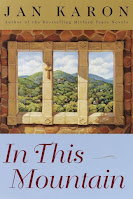 |
| (Amazon UK link) |
In this book, which I last read in 2006, they are back in Mitford, but planning to go on a mission trip for six months or so, to somewhere out in the wilds, ministering mainly to children. They’re both quite looking forward to it, and the early part of the book sees their preparations, and yet somehow Tim can’t quite believe it’s going to happen. They’re not particularly encouraged by letters arriving regularly from the people already there, describing the dire conditions they’re going to have to experience.
Then a disaster occurs. It had plenty of warnings, both for Tim and for the reader, and they are unable to go. It’s evidently the right decision; yet Tim starts to experience a deep depression of the kind he hasn’t previously known. It’s sensitively handled, as is his gradual recovery. Jan Karon could have made this rather trite; certainly Tim finds solace from the Bible and from prayer, but it takes much more than that, including medication for a while, and some exercise, and it all feels very believable.
There are other threads too, as is always the case for these books: there’s a new and unexpected lead in the search for Dooley’s siblings. There’s a former convict who arrives in Mitford, living a new, redeemed life but still arousing the suspicions of many of the villagers. There’s a book tour for Cynthia, and a gradual, reluctant foray into technology for Father Tim.
There are also conversations over breakfast at The Grill, an unpleasant encounter with Edith Mallory, a serious illness for one of the most-loved people in the stories, and just the beginnings of a friendship, with a possible romance, between Dooley and Lace.
It’s unquestionably a Christian book, with themes of redemption, prayer and forgiveness throughout, but it’s all in the context of a minister and his flock, without any pushing or coercion. The evangelistic content is very low-key, and the Biblical and hymn quotations are all in a context that feels entirely believable. There are humorous incidents too - in typos from the local paper, and the increasingly pushy letters from the mission field - and also in the many jokes told by (or to) Uncle Billy.
It would be difficult to read this as a stand-alone novel; so many of the characters have appeared in earlier books, and it’s an ongoing saga. I loved reading it because the people have got under my skin, and I like the gentle pace, character development, and the powerful grace of God shown so sensitively in these books. But it’s definitely best to read them in order, in my view, beginning with ‘At Home in Mitford’.
But if you like the series and have read the earlier ones, this is an excellent addition to the series. Highly recommended.
Review copyright 2021 Sue's Book Reviews
No comments:
Post a Comment